At first, I wanted to be charitable to Tanosuke. I wanted to say that he wasn’t to blame for all those senseless murders. Rather, he was being controlled by Nihiru, a cursed sword with an insatiable appetite for blood. If you cannot act of your own volition, then surely you are less culpable, right? The sword is evil, not him, right? But then I watched Dororo pick up the very same sword and barely manage to avoid taking a life. If a kid can do that, why can’t a grown man? You could perhaps argue that Tanosuke’s will had been broken a long time ago, so he never stood a chance. On the other hand, Dororo still has his wits about him. But even then, I feel that this doesn’t get to the root of what is truly flawed about Tanosuke. He was not born an evil man, but he nevertheless chose to follow evil in its footsteps. We see in a flashback that, as a young samurai, Tanosuke had been ordered to unjustly execute an innocent man. He tried to beg for the man’s life, but it was to no avail. His lord told him to either get the job done or kill himself. In that moment, the young samurai must have felt as though he had to survive at all costs. After all, he still had his sister Osushi back home, and he didn’t want to abandon her. He was supposed to return to her side one day. He thus took up Nihiru and killed a man. You could thus argue that Tanosuke is a tragic figure. Forced to choose between leaving his sister behind and murder, he had to choose his family. Who in his position would choose otherwise? How could he have known that this choice would end up corrupting his soul and thus forcing him into bondage?
Nevertheless, I would maintain that Tanosuke is and has been a lost cause. We need to go back even further than when Nihiru first possessed him. We need to go back to the very day he chose to depart from Osushi’s side. He told his dear sister that, as a samurai, he was duty-bound. As a samurai, he had to fight. Last but not least, as a samurai, he had to obey his lord’s orders. But what do you do when your lord is evil? What do you do when your lord tells you to commit wanton acts of violence? At his core, Tanosuke is a follower, not a leader, and that is precisely the problem. Hell, that is the problem that afflicts most of the “sympathetic” characters in this story. If he couldn’t carry out his duty to his lord, he would carry out his duty one way or another. So what we see is that he chose to defer to a demonic sword instead. What this story has established from the get-go is that men are just as heinous as the demons that haunt them. Hell, they are perhaps even worse. You could argue that it is easier to obey a sword than an evil lord. After all, the sword is simple to understand. It wants blood. It doesn’t discriminate between its victims. Like a ravenous beast with an insatiable appetite, it just has to feast. The show has also established very early on that people cannot simply hide behind the fact that they are just following orders. Jukai was just following orders, and he will now spend the rest of his life trying to atone for his sins. The villagers serving Lady Bandai can’t absolve themselves of their crimes either. She wanted to eat. They served her out of greed and pure weakness.
So to circle back to Tanosuke, he didn’t err because he felt he had to survive for his sister. He erred when he chose to romanticize the notion of being a mindless slave. We learn that Osushi and Tanosuke used to belong to a rich family, but they’ve become destitute for unknown reasons. We can thus safely assume that Osushi is all that Tanosuke has left in this world, but on that day, he still chose to obey duty and leave her. Then after five painful years apart, while she is begging him to return home with her so that they can live a peaceful life, Tanosuke throws his sister aside. The man simply cannot being a mindless follower. Being a slave is central to his very nature. Bushido, the samurai code of principles, is often romanticized in stories where samurais are involved. Honor, obedience, self-sacrifice, duty — these are all virtues wherein a man can find his self-respect. But as we’ve seen over and over again in Dororo, this self-respect is rendered meaningless if you willfully choose to be blind and abdicate your responsibility. You end up being no better than the very demons themselves. When Hyakkimaru sees Dororo wielding the cursed sword, he quickly goes on the offense. We are initially led to believe that, in his blindness, he can’t tell that he is fighting his own friend. But when Dororo finally gives in and accepts that his friend will kill him, this allows Hyakkimaru to knock the sword out of the kid’s hands. Our hero is born blind, and all he’s known in his life is that he must pursue evil. And yet, he knows to protect Dororo. This serves as a stark contrast for Tanosuke, who even after being freed from the sword’s grip, chooses to blindly return to bondage over his sister.
Unfortunately, even good actions are not without their consequences. If Hyakkimaru had tried to spare Tanosuke the same way that he spared Dororo, the man would’ve tried to pick up the sword again. Or maybe it was as simple as the fact that he just didn’t care about Tanosuke. Either way, Hyakkimaru found an opportunity to destroy the sword then and there, so he took it. In the process, he ended up cutting down Tanosuke. As a cruel coincidence, destroying allowed Hyakkimaru to get his ears back, so the very first thing he hears is the sound of a woman wailing for her fallen brother in the downpour.


Tanosuke definitely didn’t know what he was getting into when he first decided to fight. I’m not so sure about him wanting to be a follower than him wanting power. Living the dream of being a samurai became a nightmare so he went down another route. Yeah, he was no longer a samurai but in his mind he still had power/became a swordsman. Even if he knew most of that power came from the demon sword. Tanosuke probably sees using the sword less like being its servant and more like a partnership. Well, it could go either way.
This is why when I learned the original manga was created by Osamu Tezuka I drove right in. The man was a genius at writing stories.
Eh, I’m going to go with the consistent pattern I see throughout the series, which is that men being followers leads to disastrous results. He knows he has no power over the sword, and even after being freed from it, he yearns to return to it.
This is a good post. The series’ theme so far about he consequences of being a mindless follower is indeed interesting compared to the usual romanticization of following duty and honor above all else in anime and by extension Japanese media. I also think that Tanosuke might have done it to avoid taking responsibility over his past transgressions or just sunk cost fallacy to justify it like he can’t stop now, not when he is this far down the road.